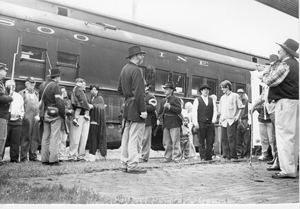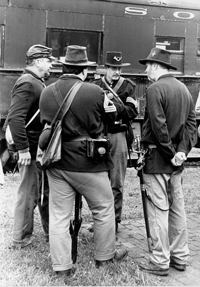The heroic actions of Reedsburg's citizens that day helped in part to convince the U.S. Government to abandon it's inhuman policy of Indian relocation.
 Day after Christmas in 1873 a crowd of angry townspeople gathered at the railroad depot to protest the forced deportation of a well-known and respected area family. The family consisted of the wife, children, and grand-children of A-Ha-Cho-Ka or Blue Wing, chief of the local Ho-Chuck tribe, whose village was located near the town. A squad of U.S. soldiers, led by Captain Hunt had been sent down from Sparta, was attempting to carry out an order to relocated the Indians to a reservation in Nebraska.
Day after Christmas in 1873 a crowd of angry townspeople gathered at the railroad depot to protest the forced deportation of a well-known and respected area family. The family consisted of the wife, children, and grand-children of A-Ha-Cho-Ka or Blue Wing, chief of the local Ho-Chuck tribe, whose village was located near the town. A squad of U.S. soldiers, led by Captain Hunt had been sent down from Sparta, was attempting to carry out an order to relocated the Indians to a reservation in Nebraska.
As soldiers were rounding up other Indian families in the Reedsburg area, an article in the Reedsburg Free Press, dated Jan 2, 1874, decried the outrage: "Our people were mad when it was first known, and as the day progressed they got madder and madder, and about six o'clock in the evening a writ of habeas corpus was sworn out before Esq. Hunt, Court Commissioner and placed in the hands of Deputy Sheriff H.D. Buel who proceeded to the Reedsburg depot, accompanied by quite a large number of our usually quiet but now thoroughly aroused citizens, determined to see the writ obeyed".
Also from the Free Press we read that "At first the officer having the Indians in charge declined to pay any attention to the writ, but seeing the determined front of the crowd, he thought better of it, and released the persons demanded, who were taken before Esq. Hunt, and after a fair hearing, they were discharged.
"The officer proceeded west on the Saturday evening train with his squad and the balance of his prisoners, telegraphing ahead that the citizens of Reedsburg had wrestled a number of them Indians from him by force of arms: which was a most untruthful and unjust report".
 Several months later, in April of 1874, the Free Press, again reported that Captain Hunt, the U.S. Indian Commissioner was in town investigating the claims of Ah-Ha-Cho-ka and his family that they had the right to remain as citizens of the community. "At first the Indians declined to show their deeds of land, discharges from the army, or other papers upon which they predicated their claims, under the mistaken impression that once in the hands of the Commissioner they would not be sent off to Nebraska, and deprived of their papers, there would be no redress for them".
Several months later, in April of 1874, the Free Press, again reported that Captain Hunt, the U.S. Indian Commissioner was in town investigating the claims of Ah-Ha-Cho-ka and his family that they had the right to remain as citizens of the community. "At first the Indians declined to show their deeds of land, discharges from the army, or other papers upon which they predicated their claims, under the mistaken impression that once in the hands of the Commissioner they would not be sent off to Nebraska, and deprived of their papers, there would be no redress for them".
Following a long talk with their white Reedsburg friends, the Indians were finally convinced that failure to turn over the papers would jeopardize their rights to remain. Captain Hunt examined the documents and in every case was able to justify their exemption from removal, "showing the utmost impartiality and justice". When some discrepancy arose, an interpreter was provided and the papers straightened out". At the same time, Hunt also admonished the Indians that they would better off to leave and go west.
The Free Press correspondent concluded the article by noting".. so long as they have the legal right to stay, (Reedsburg's citizens) will not consent to see them removed against their will".
Reedsburg Remembers 150 Years
Images: May 3, 1998- Attempted Indian Relocation pageant.